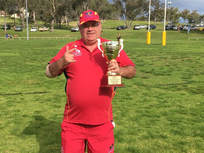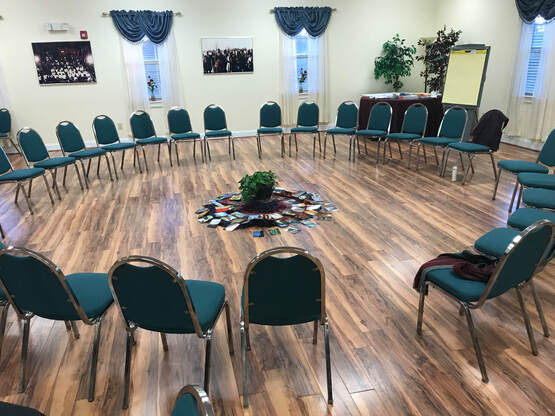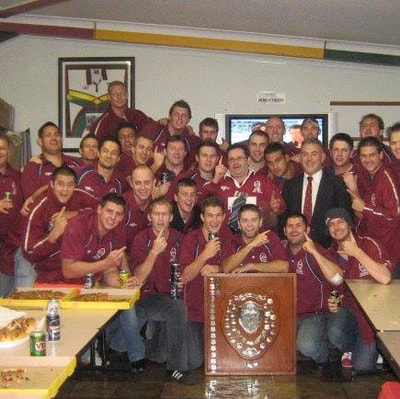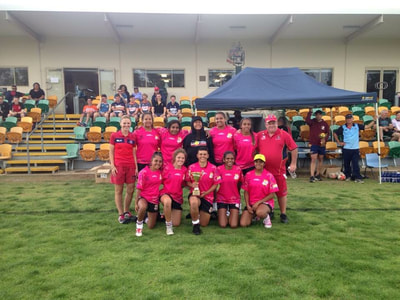|
Engaging people in circle to connect, share stories and host each other in conversations that matter....
0 Comments
Jonas shares how he applies The Circle Way in his work with organisations and start ups. Marlin Murdoch, 2016 participant, shares with Tenneson Woolf how The Circle Way has contributed to his hosting of support groups and holding space for others in his community. By Tenneson Woolf
In my nearly twenty years of being a practitioner of The Circle Way, there have been many times I’ve found myself in circles in which the participants were primarily women. Thirteen women, two men. Sometimes more women, yet the same number of men. If the ratio of men exceeds 25% of total participants, it has been noteworthy and surprising. I’ve been a bit puzzled with this observation over the years. It’s OK by the way. These have been good circles. I’ve learned a lot. Participants learned a lot together. We built strong and trusting relationships. We got some good work done. I contributed what I could, with full honesty, which is always the intent. In those groups, there have been many times when I, or someone from the group, have eventually asked, “where do you think the men are?” That question usually evokes a group chuckle — it’s a kind of tension release valve that occurs when something really obvious but unspoken is verbalized into the room. When I ask that question, to be clear, I’m not asking about men’s work. That is important and related, but a different kind of circle. I’ve been lucky to be a part of those over the years also. And, to be clear, I recognize that gender identity includes a larger spectrum than a binary choice. I’ve heard others talk about circle as a more feminine form. “It is for listening, which is what women tend to do better.” Or, “It is for feeling, which, again, is what women tend to do better.” Um..., OK..., ur.... sure. All of that is true. But it is a bit niggly and not true also. In those Circles in which I have sat over the years, wondering, I’ve asked myself a few related questions that seem just a bit bizarre. Like, “are men on the whole unable listeners?” I know, the stereotype of never asking for directions does come to mind. Sure, sometimes not good listeners, but that’s an old story, right? “Are men just fixated on command and control?” OK, sure, I get it that embedded in the male DNA are unique remnants of essential survival behaviors. Fair. But that feels old too. Or that needs to become old. I want to re-language the gender-typing just a bit as it pertains to The Circle Way. The Circle Way is a methodology and way of being that is bedrock to the kind of leadership so often needed in these times and in today’s organizations. It is the leadership that is listening, which also happens to be a lifelong practice. It is the leadership that is being smart together. Yup, that’s gender free. It is the leadership that is diving deeply into purpose. It is the leadership that is shared discernment. The Circle Way creates leadership process, and container, that invokes the best of what people, men and women, masculine and feminine, can offer as gift. I’m glad to continue to learn such things. I have known a few men in my life that have transcended many male stereotypes. There is a noticeable softness in these men. I’d call it a mature masculine, that knows a little more about how to be with others. That knows how to be curious. That knows how to ask questions, together. That knows how to lean into inherent mystery and intuitive traditions of knowing. That doesn’t need to be the star of the program. Men that have lived a shift that my friend Margaret Wheatley names, “from leader as hero to leader as host.” The Circle Way is a methodology and way of being that is bedrock to the kind of leadership so often needed in these times and in today’s organizations. There continue to be many gatherings and practicums in which men are invited. Many of these gatherings are listed on The Circle Way website. I’m proud to be to be part of these gatherings. I’m proud to be part of restorying what it means to lead, in connection to an emerging masculine and feminine. Along with those I get to host with, I remain committed to inviting and cultivating good leaders everywhere. I remain committed to working with whomever shows up, and to growing added collaborative sense-making. I continue to learn that it takes circle, the structure of connection, often, to give us enough trust to empower the more triangular and hierarchical structures of accomplishment and efficiencies. I remain committed to a unique bridging, held with some deliberateness, to invite us all to The Circle Way, women and men. Please men, there is an evolution afoot that calls for us to evolve how we go together. It’s true that men may find themselves in a context that they don’t find themselves in every day. Sitting in a Circle. Sitting on the floor. Taking long and spacious breaks. Listening to the quiet. Taking turns. But then again, men know this too, and I believe, more and more, are remembering these key aspects of leadership. I hope that the next twenty years grow us, all of us, men and women, in doing good together. In a way that, together, we as society, can mature a collective psyche through practicing together. The Circle Way is a call for all of us. Moze shares with Tenneson her reflections of The Circle Way Practicum Retreat on Sunshine Coast in Australia 2018. Carolyn shares with Penny her reflections of her learning and work with The Circle Way. from Mark Forrester I stood in the doorway of the dressing room ready to meet a newly appointed representative rugby team I was appointed to coach for the upcoming national titles. The team was diverse, members of different clubs and cultures coming together to represent Queensland. There they sat in their familial groups, as far from each other as possible within the confines of the u shaped dressing room bench. Brought together for their skill and character, yet separated by their difference. I knew what was needed. I pulled out a spare representative jersey and began our first check-in. Each team member was asked to hold the jersey, speak their name, where they are from and what the jersey meant to them before passing it on to the next player. This was the first of many circle conversations that transpired over the next ten weeks of training and title play off. As a coach I see my role as being in service of the team. I work to create an environment where players build a sense of connection, belonging and comfort to challenge themselves and each other to grow in character and relationship. Above all else the key to forming a winning team is embedding a culture where players pull together, stay in conversation and support each other the opportunity to grow will bring success both for the team and individuals. I have found the circle provides a forum for players to call each other on matters that challenge their behaviour, give each other feedback and have conversations they wouldn’t normally have. Some examples of these include:
At the beginning of subsequent games the players checked in by passing the jersey or football by stating: What is my role? How will I contribute to our victory today? And a victory is exactly what this team went on to celebrate. If I had to identify some of my learnings for bringing circle into a team or group I would say:
I have applied circle practice to coaching at all levels from amateur to elite players. I work with the focus to help players build character, connect to their community of interest and live a culture of respect and cohesion. I have watched people find their leadership through football and carry it into leadership roles in their community and work. Some players have really embraced this practice and taken circle on their own journey with them. They say “if this works at the footy club it might work in my work” and give it a go…  Mark Forrester has been coaching club and representative rugby for 17 years and is a five time premiership winning coach with many years experience at Premier grade level. Mark has a distinguished representative coaching career, most recently winning a national 7’s championship in 2016. Mark’s achievements also include Leading the Queensland Team to wins in the Barraclough Shield, Coaching Queensland against PNG, having an undefeated tenure in the annual City vs Country clash over a seven year period, coached successfully at a Junior Gold Cup and schoolboy level. Mark is actively coaching at the club coordinating the defensive coaching in the 1st grade and open men’s teams as well as a coaching Junior sides and with our junior girls and women’s 7s teams as well as continuing his current representative commitments Mark is completing his qualifications with World Rugby to gain his international accreditation. |
Archives |


